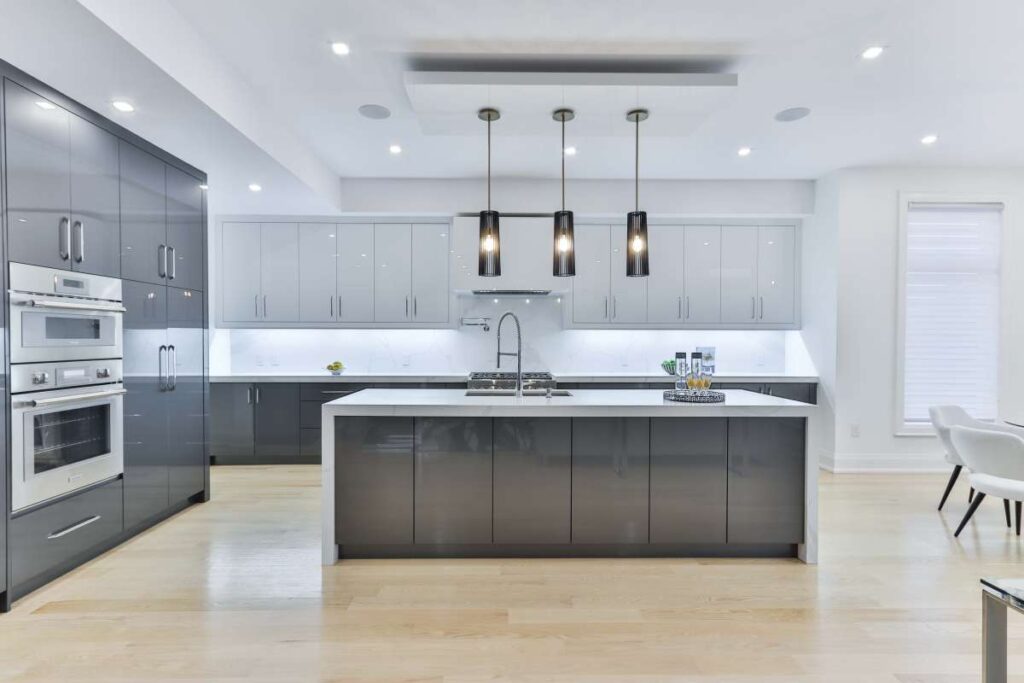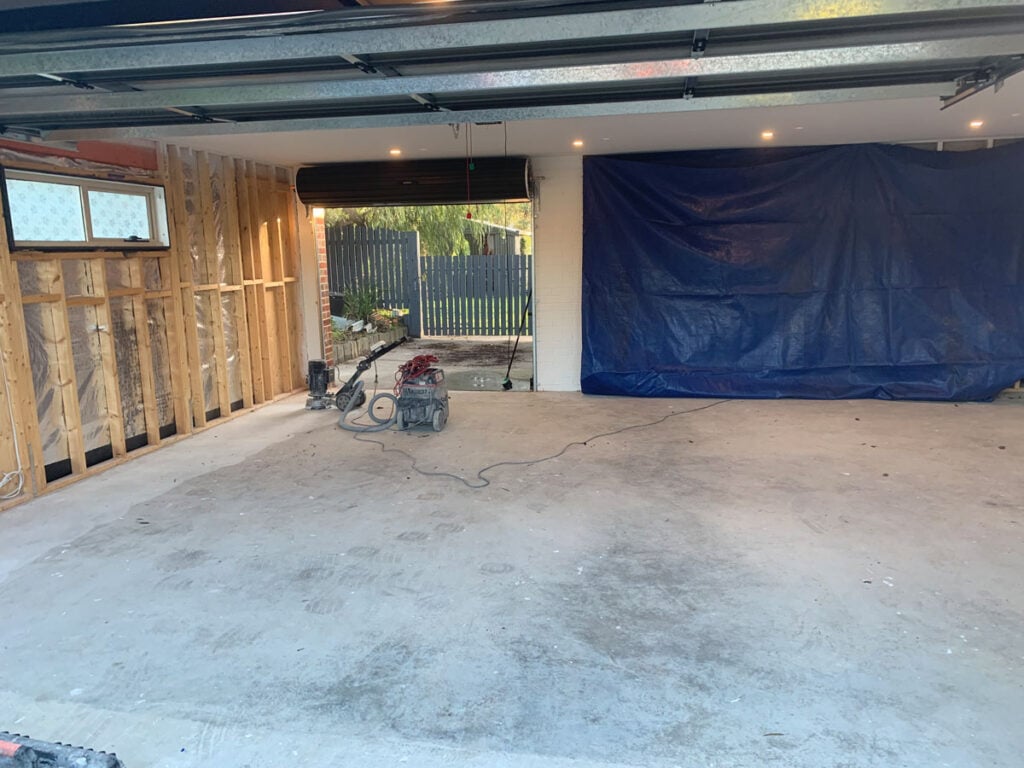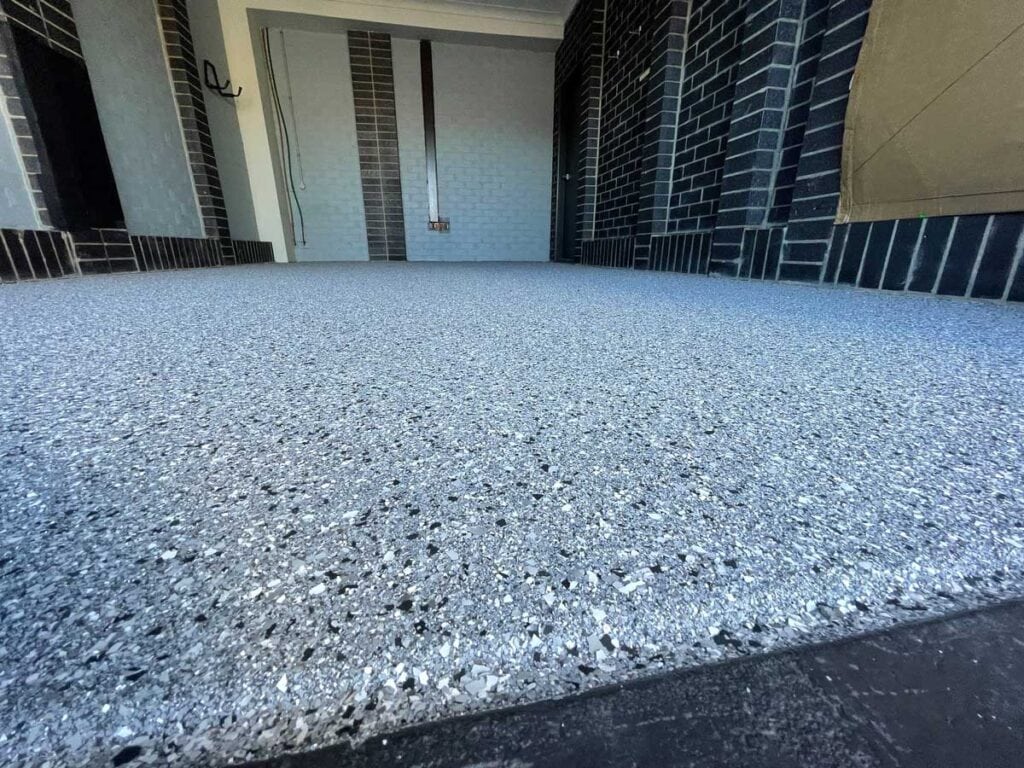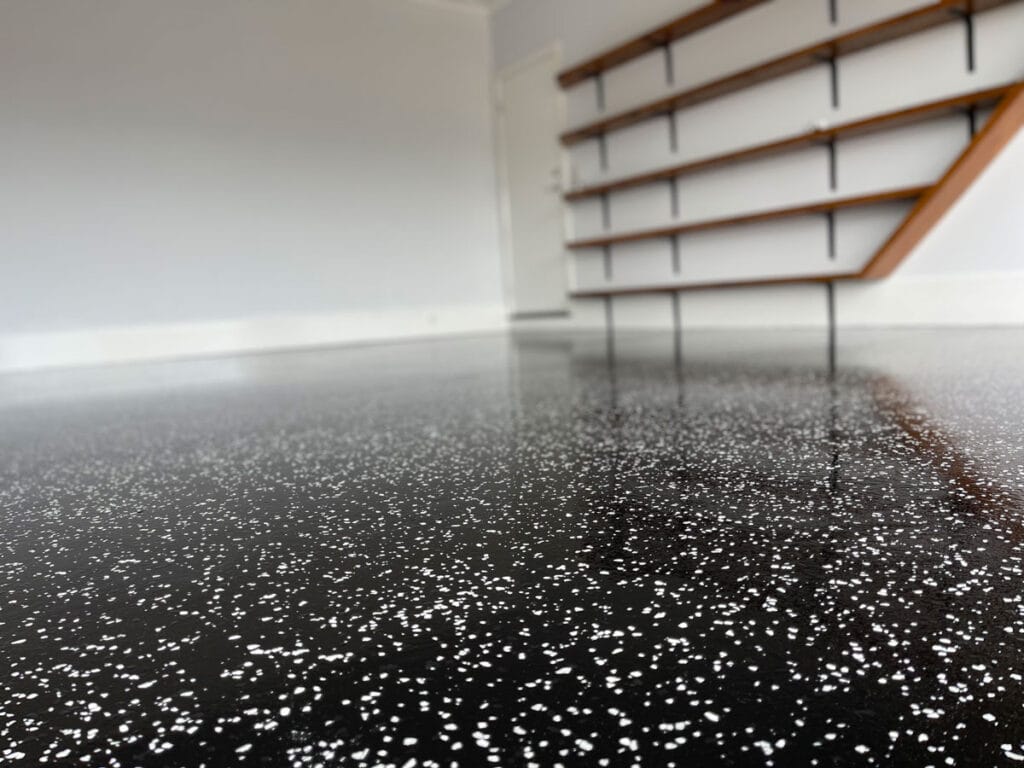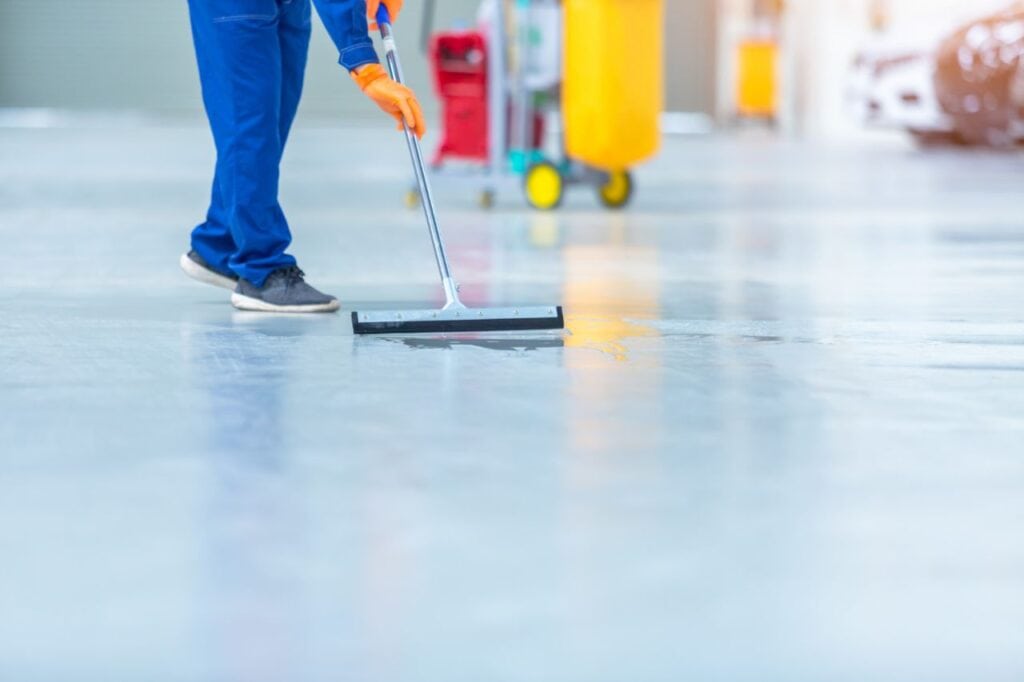When it comes to commercial kitchens, the flooring plays a crucial role. It is a demanding area that requires both aesthetics and high performance. Given the constant foot traffic, exposure to dirt, heavy equipment, and frequent spills, investing in a quality kitchen floor and protective coatings is essential.
In a bustling commercial kitchen, the choice of flooring is vital. One option is to apply epoxy floors, which enhance durability and cleanliness. Epoxy not only ensures a hygienic surface in the kitchen but also provides numerous other advantages.
The choice of the proper kitchen flooring is important, despite the fact that it is not the most glamorous aspect of running a restaurant. Your commercial floor investment will have a long-term effect on the security and cleanliness of your kitchen for many years to come.
Why Do Commercial Kitchen Floors Matter?
The choice of commercial kitchen flooring has been recognised to impact customer ordering behaviour, making it an essential aspect to consider. It significantly contributes to the overall customer experience and enhances the operational efficiency of restaurants. Selecting and implementing the appropriate flooring is crucial for creating a safe and hygienic environment in commercial kitchen facilities.
Epoxy flooring offers functional and tailor-made solutions for commercial kitchens in the following manners:
Easy to Clean and Maintain
The epoxy resin creates a sleek surface that is effortless to sweep and mop, which is particularly beneficial in commercial kitchens where spills and messes occur daily. Being able to quickly and easily clean the floors saves valuable time.
Moreover, epoxy floors are seamless, eliminating concerns about debris or contaminants trapped between seams. This seamless feature enhances the resistance of the floors to mould and bacteria, allowing for easier maintenance and keeping the floors in excellent condition.
Brightens Your Space
Compared to traditional flooring materials, epoxy excels at producing high-gloss floor surfaces. As a result, these surfaces reflect light, making the kitchen spaces appear brighter. This feature allows for better utilisation of natural light, which can ultimately lead to cost savings on electricity bills.
It provides a Slip-Resistant Surface.
When deciding on a floor for your commercial kitchen, it is imperative to prioritise slip resistance. Safety is a crucial factor to consider when evaluating flooring options for this environment.
Epoxy floor coating is known for its exceptional slip resistance. It can be combined with various additives such as paint flakes, sand, or coarser grit to enhance traction further. By using this coating, kitchen staff and customers can navigate through spills and wet surfaces with increased safety.
It holds up Well Over Time.
Due to the high volume of foot traffic in commercial kitchens, the floors are susceptible to significant wear and tear. However, epoxy can provide a solution by strengthening and enhancing the durability of the floors.
Applying an epoxy coating to your flooring significantly reduces the likelihood of issues such as chipping or cracking. Epoxy acts as a protective layer, effectively safeguarding the floors and helping maintain their good condition over an extended period.
Easy to Install
Epoxy is known for being one of the most user-friendly building materials for flooring. Its application is straightforward and does not require cutting, special equipment, or additional adhesives. As a result, many individuals opt to use epoxy as a viable alternative for their do-it-yourself (DIY) projects.
Easy to Maintain
Epoxy flooring stands out as the easiest option to clean and maintain. Considering the demanding nature of commercial kitchens, where cleanliness is paramount, high-quality epoxy floor coatings provide a non-porous and waterproof layer. This characteristic prevents dirt, dust, or debris accumulation in floor fissures and cracks. Consequently, you can be confident that colonies of microorganisms will not thrive within the epoxy-coated surface.
Stain Resistant
Similar to residential epoxy floors, opting for epoxy as your commercial kitchen flooring choice provides the advantage of stain resistance. Commercial kitchen floors are often subjected to various elements, including substantial grease. With epoxy floors, cleaning becomes a breeze as grease and stains have little chance against your mop. These floors are designed to be easily cleaned, even multiple times daily, ensuring a consistently hygienic environment in your commercial kitchen.
Cost Effective
Replacing kitchen flooring can be a costly endeavour. However, opting for epoxy coating provides an affordable solution to protect your floors from damage. Applying an epoxy coating acts as a preventative measure, helping to prolong the lifespan of your flooring.
Moreover, the epoxy coating can save you money on cleaning and maintenance. The coated floors become easier to care for, reducing the need for extensive cleaning efforts and maintenance expenses. This time and cost-saving aspect of epoxy coating provide exceptional value, particularly in commercial kitchens.
Looks Good on Floors
When it comes to epoxy colours, you have a wide range of attractive options available to complement the theme of your kitchen. The availability of multiple colours allows you to choose shades that align with your desired aesthetic. Additionally, the glossy finish of epoxy creates a bright and vibrant atmosphere, contributing to an uplifting mood for your kitchen staff.
Epoxy also offers various pattern options, making it a versatile decorative material. These patterns can be used to create visually appealing floor designs, adding an element of sophistication to your space. This feature can be particularly beneficial for branding purposes, allowing you to customise your kitchen's appearance to align with your business identity.
Furthermore, epoxy can mark and create symbols on the floor as a visual guide for workers and visitors navigating your kitchen. This enhances the overall organisation and efficiency and contributes to safety measures by clearly indicating designated areas.
Extremely Durable
One of the standout features of epoxy flooring is its exceptional durability. Commercial kitchens and high-traffic areas demand flooring that can withstand substantial wear and tear. Opting for epoxy flooring is a practical choice, as it is highly resilient and can endure heavy usage.
The durability of epoxy flooring translates to a longer lifespan, reducing the need for frequent repairs or replacements. Investing in epoxy flooring allows you to enjoy the benefits of a long-lasting and cost-effective solution, minimising the expenses associated with maintaining the flooring over time.
Water and Oil Resistant
Unlike certain flooring materials that absorb water, weaken over time, or develop unsightly oil stains, epoxy is resistant to water and oil stains. This quality is particularly advantageous in a kitchen environment where water and oil spillages are common. With epoxy flooring, you can easily clean up spills without leaving any lasting marks on the floors.
Furthermore, epoxy is reliable in situations involving chemical reactions. If your industrial process involves frequent chemical mixing, epoxy flooring is suitable. It can withstand the demands of such environments and continue to perform effectively without being adversely affected by chemical exposure.
Promotes Good Hygiene
Commercial kitchens emphasise hygiene and sterility, and epoxy coating effectively meets these strict standards. The seamless nature of epoxy flooring minimises the potential for harbouring bacteria, as there are no seams or gaps where microorganisms can accumulate. This characteristic not only enhances cleanliness but also prevents the buildup of toxic moulds, moisture, and fungus, which can be detrimental to food safety and overall hygiene in the kitchen environment.
Repairs Concrete Cracks
When repairing cracked concrete kitchen floors, epoxy is a versatile solution regardless of the floor colour. Mixing one part epoxy with one part paint can effectively repair the cracked areas without leaving noticeable marks. Epoxy can penetrate the cracks and restore even severely damaged concrete surfaces, providing a seamless and visually appealing result.
Additionally, epoxy is an excellent choice for masking wall damage and covering up unsightly chips and cracks. Its versatility allows for efficient and effective repair work, helping to restore the overall appearance and functionality of your kitchen floor.
Chemical Resistance
Daily cleaning and sanitisation are necessary in commercial kitchens to prevent contamination and ensure food safety. Solid and harsh cleaning solutions are often used to eliminate bacteria and maintain hygiene. However, these cleaning formulas can damage certain types of flooring.
Epoxy coating, on the other hand, offers a robust and durable surface that can withstand the rigours of daily operations in a commercial kitchen. It provides a protective layer that can endure robust cleaning solutions without compromise. Furthermore, epoxy floor coating is highly resistant to extreme heat, making it suitable for the demanding conditions of a kitchen environment where hot equipment and cooking processes are involved.
Heat Resistant
Epoxy coating can enhance the heat resistance of flooring, particularly when a high-grade epoxy is utilised. This characteristic adds another layer of safety to commercial kitchens. Epoxy protects the floors from damage caused by boiling water and hot pans and reduces the risk of fire hazards.
Since flames and high temperatures are standard in commercial kitchen environments, taking necessary precautions is essential. Applying an epoxy coating to the floor can protect against heat damage, contributing to the overall safety of the kitchen.
Better Return on Investment
In terms of pricing, epoxy flooring tends to be costlier than other flooring options. This is due to the nature of its ingredients and the intricate manufacturing process involved. However, despite the higher upfront cost, epoxy flooring offers excellent value for money, especially for commercial kitchen floors.
Epoxy flooring provides exceptional results and long-term durability, making it a worthwhile investment. Once installed, epoxy requires minimal maintenance and has a long lifespan, reducing the need for frequent repairs or replacements. Therefore, while the initial cost may seem significant, the long-term benefits and cost savings make it a wise choice for commercial kitchens.
Why Should Commercial Kitchen Floors Matter?
Those familiar with the commercial food industry know the critical importance of kitchen flooring. The demands placed on kitchen floors go well beyond those of ordinary flooring. Here are a few factors that make kitchen floors particularly challenging:
- Heavy traffic: The floors of commercial kitchens suffer. They must remain sturdy in the face of heavy foot traffic. They must simultaneously resist spills and protect themselves from heat damage.
- Kitchen flooring must be visible and attractive. The kitchen is frequently at least partially visible to customers. Additionally, it demonstrates the company's distinctive atmosphere and gives clients confidence that the kitchens are spotless. A commercial kitchen floor must, therefore, function well and be aesthetically pleasing.
- Sanitation laws: Flooring is frequently subject to laws to protect customers and workers. Customers' safety is endangered by flooring that is difficult to keep clean. Kitchen floors must be seamless and straightforward due to the high potential for food accumulation, pooling, and bacteria collection.
- Safety requirements: Flooring should always contribute to the productivity and safety of employees. As a result, it must be non-slip and resistant to chips and grease.
How to Apply Epoxy in the Right Situations on Commercial Floors
The effectiveness of epoxy on your commercial kitchen floors depends on the application process. It involves understanding the properties of your concrete surfaces, properly preparing the epoxy, and applying it under optimal conditions. It is crucial to note that this is not a rushed process, and it requires careful attention and adherence to the guidelines provided on the epoxy packaging.
It is important to avoid applying epoxy in hot environments, as this can cause bubbling and eventually lead to the peeling of the epoxy coating. Additionally, using epoxy on a previously polished concrete surface is not suitable. Before applying epoxy, it is necessary to repair any substantial damage, thoroughly remove dust and lose debris, and ensure grease removal to create a functional epoxy floor lasting for years.
Conclusion
Commercial kitchens cannot function without epoxy floors because of their durability and cleanliness. They are hygienic, attractive, and nonslip, to name a few benefits. Smooth and easy to wipe and sweep, epoxy resin floors also have no seams to hold dirt and other impurities. It's also slip-resistant, and you can improve its traction even more by mixing in things like paint flakes, sand, or coarser grit. Commercial kitchens frequently use epoxy because it is long-lasting, simple to install, and simple to keep clean.
It's cheap, easy to install, and doesn't look bad on floors, too. It creates a barrier that is both impermeable to moisture and water, meaning that dirt, dust, and debris won't be able to settle into the floor's crevices and gaps. It's also a non-porous and waterproof layer, so it won't let dust, filth, or debris collect in the crevices of your floor. It's also cheap, easy to maintain, and aesthetically pleasing when used as flooring. Commercial kitchens and other high-traffic areas can benefit from epoxy flooring since it is long-lasting and affordable.
It may hide concrete fractures without affecting its appearance, is resistant to water and oil stains, and encourages cleanliness. Also, it can take a beating without breaking or wearing out, thus maintenance and replacements will be less frequent. It can withstand chemical reactions and is safe to use with water and oil. Due to its durability to chemicals, heat, and a higher rate of return on investment, epoxy flooring is a great option for commercial kitchens. Although it is more expensive than some other flooring choices, it is well worth it because of the high quality of its results and its longevity.
Due to constant foot traffic and other stresses, commercial kitchen flooring presents unique difficulties. Epoxy flooring is a good choice because it is long-lasting and produces excellent results. Floors in commercial kitchens need to be tough, stain-proof, visible, appealing, easy to clean, chip-proof, and grease-proof. Using epoxy successfully requires familiarity with concrete surface characteristics, careful epoxy preparation, and ideal application conditions. Before applying epoxy, make any necessary repairs, clear the area of dust and debris, and wipe away any oil.
Content Summary
- The choice of flooring in commercial kitchens is crucial for aesthetics and high performance.
- Epoxy floors enhance durability and cleanliness in commercial kitchens.
- The choice of kitchen flooring impacts customer ordering behaviour and overall customer experience.
- Epoxy floors are easy to clean and maintain, saving valuable time.
- Seamless epoxy floors prevent debris and contaminants from getting trapped.
- Epoxy floors brighten the kitchen space by reflecting light, leading to cost savings on electricity bills.
- Epoxy floors provide a slip-resistant surface for increased safety.
- Epoxy coating strengthens and enhances the durability of commercial kitchen floors.
- Epoxy floors are easy to install and maintain, making them suitable for DIY projects.
- Epoxy floors are non-porous and waterproof, preventing dirt and dust accumulation.
- Epoxy floors are stain-resistant, making cleaning grease and stains easy.
- Opting for epoxy coating is cost-effective and prolongs the lifespan of the flooring.
- Epoxy floors offer a wide range of attractive colours and patterns to complement the kitchen's theme.
- The glossy finish of epoxy creates a bright and vibrant atmosphere in the kitchen.
- Epoxy floors are extremely durable and can withstand heavy usage.
- Epoxy flooring is resistant to water, oil stains, and chemical reactions.
- Epoxy coating promotes good hygiene by minimising bacterial accumulation and preventing mould and fungus growth.
- Epoxy is versatile and can repair concrete cracks and mask wall damage.
- Epoxy coating is resistant to harsh cleaning solutions used in commercial kitchens.
- Epoxy flooring enhances heat resistance, protecting against damage from hot equipment and reducing fire hazards.
- Despite the higher upfront cost, epoxy flooring offers a better return on investment due to its long-term durability and minimal maintenance.
- Kitchen floors in commercial settings face heavy foot traffic and must resist spills and heat damage.
- Kitchen flooring must be visible, attractive, and meet sanitation laws for cleanliness.
- Safety requirements demand non-slip and chip-resistant flooring in commercial kitchens.
- The application process of epoxy requires proper preparation and adherence to guidelines for optimal results.
- Applying epoxy in hot environments can cause bubbling and peeling of the coating.
- Epoxy is not suitable for previously polished concrete surfaces and requires repairs and thorough cleaning before application.
- Epoxy floors contribute to a safe and hygienic environment in commercial kitchens.
- The epoxy coating enhances the overall appearance and functionality of kitchen floors.
- Careful attention and adherence to guidelines are necessary for a functional epoxy floor that lasts for years.
Frequently Asked Questions
Epoxy floors are a sought-after option for flooring, especially commercial flooring, because of their added safety, chemical resistance, and unmatched durability. The anti-skid/anti-slip properties make commercial work environments safer by reducing the risk of workplace accidents caused by slippery floors.
Epoxy is More Durable
That's because it's made of heavy-duty, resin-based polymers that are impact-resistant and heat- and fire-resistant. Epoxy flooring can typically last for up to 20 years. Also, epoxy is much easier to clean than concrete, making it deficient in maintenance.
Once the epoxy is cured, it becomes an inert plastic as long as it is cured fully and correctly. This usually means it is safe for incidental food contact. But, the resin can be affected by anything you add, such as dyes, inks, powders, decorative inclusions, and more.
Its exceptional bonding properties, resistance to chemicals and moisture, and ability to withstand moderate temperatures make it a go-to choice for various applications. From providing a waterproof barrier to heat resistance and high strength, epoxy resin offers a range of benefits.
The mechanical properties of epoxy resin concrete are significantly improved compared to ordinary concrete, and its tensile strength, compressive strength, and shear strength are all higher than those of ordinary concrete.
